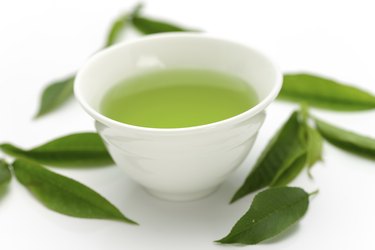
Green tea is a healthy beverage that contains beneficial plant compounds called flavonoids. If you're new to green tea, you may experience some mild side effects such as loose stools. This is due to the caffeine content. Some individuals are more sensitive to these effects than others, but hang in there. This side effect is usually temporary and will likely go away as your body gets used to the caffeine. In the meantime, take steps to reduce the risk of diarrhea and prevent associated issues like dehydration.
Benefits of Green Tea
Video of the Day
The main flavonoid in green tea is epigallocatechin gallate, or EGCG. Like all flavonoid compounds, EGCG is known for its antioxidant activity. It scavenges unstable molecules known as free radicals that can accumulate and cause what's known as oxidative stress. When your body is under oxidative stress, it's unable to repair itself properly, resulting in damage at the cellular level. Free radical damage plays a role in heart disease, certain cancers and other chronic diseases, according to a June 2008 article in the International Journal of Biochemical Science.
Video of the Day
In addition to its antioxidant benefits, tea is rich in theanine -- an amino acid that is nearly exclusive to green tea -- and has a calming effect. Theanine possesses the ability to cross the blood-brain barrier and block stimulating brain chemicals, according to the Memorial Sloan-Kettering Cancer Center.
How Green Tea Causes Loose Stool
The caffeine in green tea stimulates your intestines in a couple of ways. For one, it may cause your intestines to draw in more fluid, thus increasing the amount of water excreted when you have a bowel movement, according to an article published in the journal Mayo Clinic Proceedings in 2012. It may also stimulate motility, causing your bowels to move sooner than usual. This is particularly true if you drink caffeine-containing beverages like green tea in the morning. It's the shorter transit time and increased fluid excretion that can lead to loose stools, especially if you are sensitive to caffeine.
Reduce Risk of Diarrhea From Green Tea
Diarrhea is an uncomfortable side effect certain people experience after drinking green tea. When you have watery stools, you lose more electrolytes and run the risk of dehydration. A good idea to reduce the chances of diarrhea is to decrease the amount green tea you drink initially. Once your body gets used to it, you can drink more. Another strategy is to avoid drinking green tea on an empty stomach. Instead, have it with a full meal, such as breakfast. Having food in your stomach reduces the digestive side effects of caffeine. If you prefer to drink green tea between meals, try having it later in the day, such as in the afternoon, since the digestive effects are more pronounced in the morning.
Prevent Side Effects Related to Diarrhea
Bouts of diarrhea increase the risk of electrolyte imbalance and dehydration. If you have watery stools from drinking green tea, boost your intake of clear beverages, such as water, to help put fluids back in your body. The extra fluid will help prevent dehydration. Don't wait until you're thirsty either. By the time your body signals you to drink, you may already be dehydrated. In addition, eat foods that help replenish your electrolytes. Salty foods can help replace sodium. Fruits, especially bananas, oranges and avocados, are rich in potassium, while beans, nuts, seeds and yogurt are rich in magnesium and calcium. Stop drinking green tea and consult your doctor if you experience severe diarrhea, and ask your health care provider to rule out conditions such as irritable bowel syndrome and inflammatory bowel.